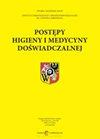Prognostic value of SMAD4 in resectable pancreatic cancer
IF 0.3
4区 医学
Q4 MEDICINE, RESEARCH & EXPERIMENTAL
引用次数: 1
Abstract
Abstract Introduction The tumor gene SMAD4 was genetically inactivated in approximately half of pancreatic cancer (PC) patients. The correlation of SMAD4 gene expression in PC and its prognosis remains inconclusive. The aim of this study was to evaluate the association between loss of SMAD4 expression and the outcome of resectable PC. Materials and Methods A systematic review of the relevant electronic databases was conducted between SMAD4 expression and the outcome of PC patients until December 2020, including PubMed, Web of Science, and the China Journal Net. A meta-analysis was performed using STATA 12.0 and pooled hazard ratios (HRs) with 95% confidence intervals (CIs) were used to estimate the strength of the association between SMAD4 gene expression and the prognosis of PC patients. Results Twelve studies were included. Our meta-analysis illustrated that there were no significant associations between the loss of SMAD4 gene expression and overall survival in resectable PC (HR=1.38, 95% CI 0.98–1.81). In addition, there was no evidence of publication bias, as showed by Begg's and Egger's test. There was no correlation between the loss of SMAD4 expression and local recurrence (OR=0.97, 95% CI 0.52–1.80, p=0.914), while the loss of SMAD4 gene expression was associated with increased risk of distant recurrence (OR=1.36, 95% CI 1.08–1.70, p=0.008). Conclusions After PC resection, the loss of SMAD4 gene expression was correlated with higher risk of distant recurrence, but not with local recurrence nor overall survival.SMAD4在可切除胰腺癌中的预后价值
在大约一半的胰腺癌(PC)患者中,肿瘤基因SMAD4基因失活。SMAD4基因在PC中的表达与预后的关系尚不明确。本研究的目的是评估SMAD4表达缺失与可切除PC预后之间的关系。材料与方法系统检索截至2020年12月的SMAD4表达与PC患者预后的相关电子数据库,包括PubMed、Web of Science和中国期刊网。使用STATA 12.0进行荟萃分析,并使用95%置信区间(ci)的合并风险比(hr)来估计SMAD4基因表达与PC患者预后之间的关联强度。结果共纳入12项研究。我们的荟萃分析表明,SMAD4基因表达缺失与可切除PC患者的总生存率之间没有显著相关性(HR=1.38, 95% CI 0.98-1.81)。此外,Begg’s和Egger’s检验也没有发现发表偏倚的证据。SMAD4基因表达缺失与局部复发无相关性(OR=0.97, 95% CI 0.52 ~ 1.80, p=0.914),而SMAD4基因表达缺失与远处复发风险增加相关(OR=1.36, 95% CI 1.08 ~ 1.70, p=0.008)。结论PC切除术后,SMAD4基因表达缺失与远处复发风险升高相关,但与局部复发和总生存期无关。
本文章由计算机程序翻译,如有差异,请以英文原文为准。
求助全文
约1分钟内获得全文
求助全文
来源期刊

Postȩpy higieny i medycyny doświadczalnej
MEDICINE, RESEARCH & EXPERIMENTAL-
CiteScore
0.60
自引率
0.00%
发文量
50
审稿时长
4-8 weeks
期刊介绍:
Advances in Hygiene and Experimental Medicine (PHMD) is a scientific journal affiliated with the Institute of Immunology and Experimental Therapy by the Polish Academy of Sciences in Wrocław. The journal publishes articles from the field of experimental medicine and related sciences, with particular emphasis on immunology, oncology, cell biology, microbiology, and genetics. The journal publishes review and original works both in Polish and English. All journal publications are available via the Open Access formula in line with the principles of the Creative Commons licence.
 求助内容:
求助内容: 应助结果提醒方式:
应助结果提醒方式:


